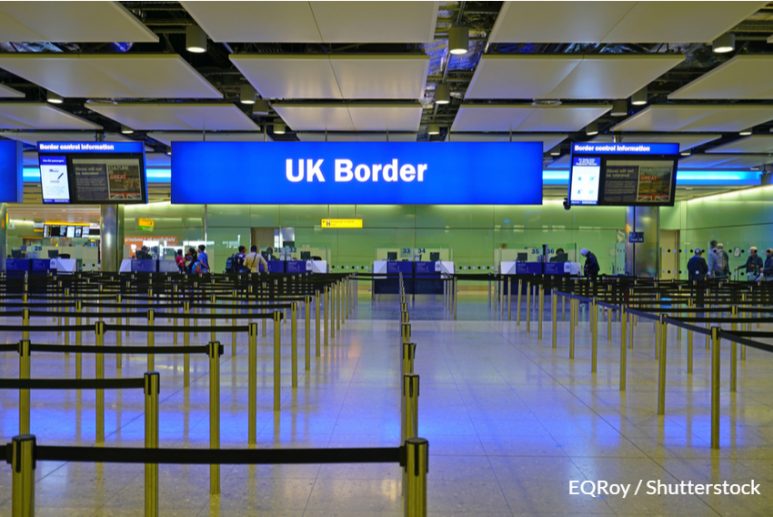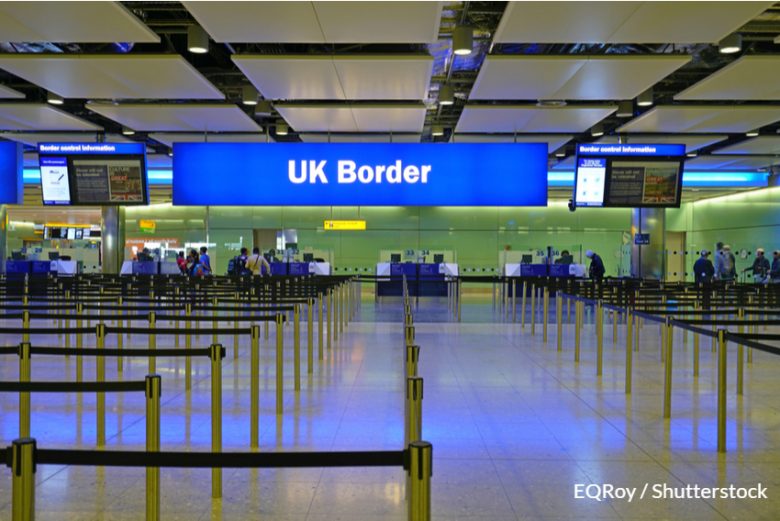By Angelo Boccato
@Ang_Bok
The UK’s Nationality and Borders Bill is only the latest piece of a puzzle of Draconian legislation on migration, which is widely known as the “hostile environment”. This legislation affects migrants, refugees and asylum seekers in the country, as well as those citizens whose ancestry originates in Africa, Asia or in the Caribbean, not to mention EU citizens in the UK.
“The ‘hostile environment’ refers to a specific set of policies that were introduced by Theresa May [as Home Secretary in David Cameron’s cabinet] that were aimed for undocumented immigrants living in the UK. The government would make all of these different changes to make it basically impossible for people without documents to go about everyday life, through a kind of outsourcing of immigration control to public services” journalist and author Daniel Trilling tells Media Diversity Institute.
The roots of this current framework can be traced back to Gordon Brown and Tony Blair’s New Labour governments as Daniel Trilling describes in his Guardian investigation into the Home Office’s inner workings of the hostile environment.
At the same time, a climate of institutional racism has always been present in the UK since the post WWII years. The Windrush Scandal for example exposed this institutional racism and hostility towards communities originating from the West Indies.
The documentary ‘Hostile’ by independent producer and director Sonita Gale, explores the nature of the hostile environment and the cracks within the British multicultural society caused by the government’s policies. Her film brings together a wide range of voices that include international students as well as prominent figures such as social commentator and Windrush campaigner Patrick Vernon OBE, and Labour MP Zarah Sultana.
“The film argues that the roots of the Hostile Environment stretch back to the British Empire, and the subsequent backlash to migrant populations from Commonwealth countries that were coming into this country. Since the late 1990s, things changed – rather than just putting limits and restrictions on the number of migrants coming into this country, what started was an emphasis on making lives more difficult for those who were already here” highlights Sonita Gale whose parents migrated to the UK in the 1950s, almost ten years after the partition of India and Pakistan.
“The No Recourse to Public Funds rule introduced by Labour is the prime example for this. It says that even though you pay taxes, if you are here on a Leave to Remain visa and fall on tough times, you have no access to the state benefits you contribute to,” Gale further adds.
“The current government then stepped up these restrictions, ramped up deportations, and even put requirements on Landlords, the NHS and charities to carry out ID checks. The film shows that surveillance has increased and doctors and nurses have effectively become border guards. The current government introduced a Points Based System that would have made it impossible for families like hers [Home Secretary Priti Patel] and mine to have entered the country,” Gale tells Media Diversity Institute.
“The Home Office is now taking it a huge step further with the Nationality and Borders Bill. This redefines which asylum seekers are considered legal and can even strip nationals of citizenship,” she adds.
Several human rights organisations, including Amnesty International, criticised the British Government’s plans to strip people of their citizenship.
“What the new bill, with Clause 9, would be doing is allowing the government to go through that process [of stripping someone’s citizenship] without having to give warning to the person that it wants to take the citizenship away from. Actually the power to strip citizenship from people in that way has been around since about 2014, and other powers to do so have existed for much longer than that” explains Trilling.
Also, as Trilling further points out it would supposedly be only possible to do so if the person in question has another citizenship. But, as we have seen in the Shamima Begum case, while Begum could have applied for Bangladeshi citizenship after being stripped of her British one, the Bangladeshi authorities refused to allow her to do so, leaving her in fact, stateless and stranded in Syria.
While the case of Shamima Begum may play right into the right-wing arguments on citizenship and rights, this is still a fundamental violation of the Universal Declaration of Human Rights which states “everyone has a right to nationality”.
The media’s role
The media have played a key role in the establishment of the hostile environment, particularly the tabloids on the right-wing spectrum who often incite the most discriminatory sentiments in British society.
“I think that’s been a fairly constant point of sensationalised right-wing media coverage for over 20 years. If you go and look at the press coverage of asylum in the late 90s you would find the same kind of stigmatising on overhyped coverage of today,” Trilling underlines.
“I think that the media coverage on migration, rather than being more or less right wing, is influenced by a mixture of responses to external factors, like when there’s a refugee crisis there would be more coverage obviously, but also when there are political uses for such coverage, like in the run up to the EU referendum in 2016,” he continues.
“The Home Office has always been a department that is living in fear of what the right wing press is going to say, and of what they have to do if the right-wing press finds out that they are getting something wrong,” Trilling further points out.
One of the central issues around this conversation, in the UK, is that it lacks diversity on two levels: the tone of the conversation, which is overall negative and dehumanising towards migrants, refugees and asylum seekers and the lack of diverse voices who have experience of migration or asylum or that can at least relate to the ones of the generations that preceded them.
The Refugee Journalism Project, headquartered at the London College of Communication and founded by Dr. Vivienne Francis, Senior Lecturer in Social Justice Journalism, is focused on diversifying the voices in the conversation, supporting experienced journalists who came to the UK as refugees, in working in the field.
“What we try to do is to address some of the specific barriers and challenges that they face. We run workshops, we have mentoring opportunities, some publishing and work opportunities. One of the major barriers is the human challenge of being uprooted from their home, from their loved ones,” Francis tells Media Diversity Institute.
“Another thing that we try to do is respond to the poor representation of migration in a number of ways,” she continues.
Francis also explains that many of the journalists that have been supported by the Project had extensive careers , while some of them were also targeted for what they covered in their work in their countries; additionally the lack of opportunities, and paid opportunities for them in the UK was also part of the inspiration in launching the Project.
The Refugee Journalism Project has also conducted a report on the representation of migrants, refugees and asylum seekers in the British media called “Breaking the Frame”.
Some of the elements pointed out in the report reveal that 64% of news broadcasts about refugees do not feature a refugee, 33% of news broadcasts about refugees present refugees as threats, despite only 10% of those news broadcasts containing threatening images, 94% of news broadcasts about refugees were only dedicated to ‘hard news topics’ (terrorism, crime, economy, Brexit), ignoring opportunities for more positive ‘soft news’ representation and refugees surveyed stated that news broadcasts on refugees are “if not misleading, at least incomplete”.
The migration discourse in the country has to be detoxified. Mainstream and independent media need to diversify the conversation, or increase their efforts in doing so. It remains to be seen whether this is going to lead to a growth of diverse voices on migration, in the mainstream media and in the general conversation.
Photo Credits: EQRoy / Shutterstock


